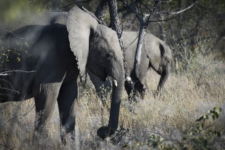
‘Cruel’ Plan to Kill 850 Wild Animals Condemned by PETA
A controversial wild animal cull has begun in Namibia, initiated by the government in response to the country’s worst drought in decades and rising human-wildlife conflicts.
The cull, which has already resulted in the death of more than 150 animals, is set to eliminate over 700 more, including elephants, zebras and hippos. Announced last week by the Ministry of Environment, Forestry and Tourism, the cull aims to reduce grazing pressures, increase water availability and provide game meat to locals as part of a broader drought-relief effort.
The plan has drawn strong opposition from animal rights groups, with People for the Ethical Treatment of Animals (PETA) labeling the cull as shortsighted, ineffective and cruel. In an open letter to the prime minister, PETA’s senior vice president, Jason Baker, warned of the potential devastation the cull could cause to wildlife populations.
“Killing even a few [elephants] could devastate entire herds, leading to chaos, increased mortality among the survivors, and the risk of frustrated animals aggravating human-animal conflicts,” Baker wrote.

MARTIN BUREAU/Getty
Newsweek has approached the Ministry of Environment, Forestry and Tourism for comment via its website.
PETA argues that Namibia is scapegoating wildlife for broader issues that demand long-term, strategic solutions. The organization expressed concern about several unintended consequences of the cull, including the risk of zoonotic diseases.
“COVID-19, SARS, HIV, Ebola and other zoonotic diseases have shown the world the dangers of butchering and consuming wild animals,” Baker said.
There are also fears that the cull could disrupt delicate ecosystems. “The killing of these animals could lead to imbalances and worsen suffering, since every species plays a vital role in ecosystems,” he said.
Speaking to Newsweek, Baker said he is yet to receive a response form the government, though he is “hopeful it will get their attention.”
“Unfortunately, this isn’t the country’s first cull, and without a plan, I fear it won’t be the last,” he said. “This only continues to damage Namibia’s image, harm its tourism industry, and cause immense suffering for animals.”
The drought situation in Namibia is severe. On 22 May, 2024, the president declared a state of emergency following the worst drought in 100 years.

Food reserves are critically low, with nearly half of the population facing hunger. The United Nations and the U.S. government are working to provide relief, along with other partners, particularly for malnourished children.
But PETA questions the effectiveness of the cull in addressing these issues. “Meat from a few hundred animals will not come anywhere close to addressing this calamity, and the sources of water for humans and livestock as opposed to those for wild animals—who reside in Namibia’s national parks—are not the same,” Baker said.
The animal rights group has also raised concerns about possible “ulterior motives” behind the cull, alleging that trophy hunters may be allowed to kill animals in exchange for fees. “Profit may be a driving factor in these cruel plans,” the organization suggested on its website.
The Namibian government is yet to respond to these allegations, however, in its statement last week the environment ministry defended the cull, stating, “This exercise is necessary and is in line with our constitutional mandate where our natural resources are used for the benefit of Namibian citizens.”
Do you have a tip on a science story that Newsweek should be covering? Do you have a question about wildlife culls? Let us know via science@newsweek.com.
Update 09/05/24 at 4:50 a.m. ET; This article was updated with further comment from PETA.



